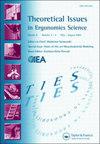Modeling cause-and-effect relationships among predictive variables of human error based on the fuzzy multi-criteria decision-making method
IF 1.4
Q4 ERGONOMICS
引用次数: 4
Abstract
Abstract Human error is the result of different variables the study of which helps prevent committing such errors. This study aimed at modeling the cause-and-effect relationships among different variables that can predict human error based on the fuzzy multi-criteria decision-making method. The study was carried out based on the opinions of 17 safety experts in 2020. The variables of the study were determined by reviewing previous research and the expert panel’s brainstorming process. The results revealed that among 14 studied variables, shift work, job satisfaction, environmental discomfort and role conflict can be singled out as the root causes of human error. Although human error is affected by each studied variable, each variable can influence human error differently. Hence, safety and controlling measures presented to reduce and prevent human error need to take into account the different roles and influence weight of variables. The result of this study is applicable to researchers and managers in different work environments.基于模糊多准则决策方法的人为误差预测变量因果关系建模
摘要人为错误是不同变量的结果,研究这些变量有助于防止犯下此类错误。本研究旨在基于模糊多准则决策方法,对能够预测人为失误的不同变量之间的因果关系进行建模。这项研究是根据2020年17位安全专家的意见进行的。这项研究的变量是通过回顾以前的研究和专家小组的头脑风暴过程来确定的。结果表明,在14个研究变量中,轮班工作、工作满意度、环境不适和角色冲突可以被单独列为人为错误的根本原因。尽管人为错误受到每个研究变量的影响,但每个变量对人为错误的影响不同。因此,为减少和防止人为错误而提出的安全和控制措施需要考虑变量的不同作用和影响权重。这项研究的结果适用于不同工作环境中的研究人员和管理人员。
本文章由计算机程序翻译,如有差异,请以英文原文为准。
求助全文
约1分钟内获得全文
求助全文

 求助内容:
求助内容: 应助结果提醒方式:
应助结果提醒方式:


